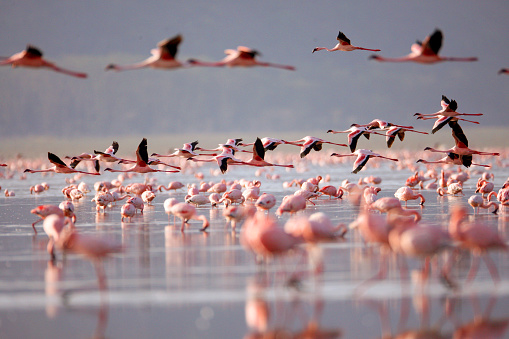
World Migratory Bird Day: Protecting birds and their migration

In 2006, the World Migratory Bird Day was inaugurated to highlight the need for the conservation of migratory birds and their habitats.
There are about 11,000-bird species on the planet and Africa is home to more than 2300 of them. One-in-five of the 11,000 species of birds on the planet is considered migratory. Forty percent are in decline, with one-in-eight under threat of global extinction.
These birds face many threats to their existence including habitat-loss and degradation, caused by agricultural and coastal development, unsustainable harvesting, and illegal killing and theft.
In Kenya, the lakes system supports about 11 globally threatened bird species. In recent years, the country has faced a number of challenges, pollution, deforestation and urbanization, in the effort to preserve the habitats of migratory birds.
A case in point is the pumping of raw sewage into Lake Nakuru. This substantially damages the quality of water and caused the deaths of several Lesser Flamingoes. The birds are a major tourist attraction but the sewage problems forced the species to migrate to Lake Bogoria.
Earlier in 2019, a series of fires destroyed thousands of acres of vegetation in Mount Kenya, the Aberdare range, Arabuko Sokoke and Mau forests. Arson is suspected in several of those fires and the dry condition brought on by drought made the fires even more devastating.
Nature Kenya recommends involving local people in restoring degraded forest areas and monitoring biodiversity in their respective areas through training to enhance capacity to sustainably manage and conserve forests using a participatory approach.
BirdLife says enforcement of legislation to curb the killing of migratory birds is not enough. It says that education to change minds is also necessary as some forms of illegal killing have roots in the cultural traditions.
Moreover, BirdLife says dangerous powerlines need to be buried and unnecessary fences brought down to prevent deadly collisions with birds. It further calls for the protection of the linked chain of wetlands along the world’s migration flyways to support birds along every step of their route.
Two UN wildlife treaties and conservationists have also called for urgent action to stop plastic pollution by highlighting its negative effects on seabirds and other migratory birds.
In 2018, members of the African Eurasian Waterbird Agreement adopted a resolution on seabird conservation which includes actions countries can take to reduce the risk caused by plastic waste on migratory birds.
The UN notes that efforts to phase out single use plastics and redesign plastic products to make them easier to recycle are underway in many countries. Kenya, Uganda and Rwanda are some of the African countries that have implemented bans on single use plastics.
As the world celebrates World Migratory Bird Day everyone needs to do their part to ensure the stepping stones to their migration and habitats are protected.






